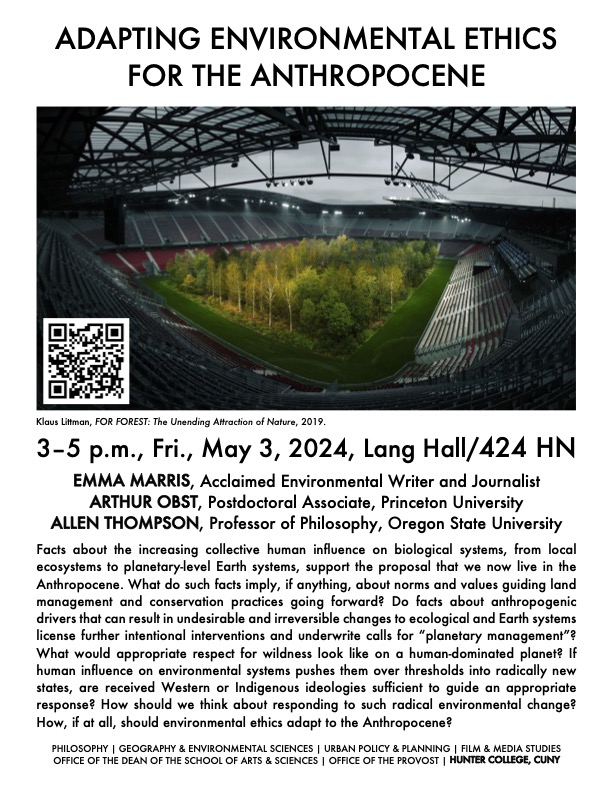Facts about the increasing collective human influence on biological systems, from local ecosystems to planetary-level Earth systems, support the proposal that we now live in the Anthropocene. What do such facts imply, if anything, about norms and values guiding land management and conservation practices going forward? Do facts about anthropogenic drivers that can result in undesirable and irreversible changes to ecological and Earth systems license further intentional interventions and underwrite calls for “planetary management”? What would appropriate respect for wildness look like on a human-dominated planet? If human influence on environmental systems pushes them over thresholds into radically new states, are received Western or Indigenous ideologies sufficient to guide an appropriate response? How should we think about responding to such radical environmental change? How, if at all, should environmental ethics adapt to the Anthropocene?

ABSTRACT: Spurred partly by recent attempts to ethically assess various negative effects of the attention economy, philosophers have begun to pay more attention to the role that attention plays in our ethical lives. This has included some more general discussion of the ethics of attention. In this talk, I add to this recent discussion by outlining a proposal for a comprehensive ethics of attention. On my proposal, an ethics of attention includes norms that stem from the role that attention plays in the formation of our character, in constituting our relationships and social roles, and in our other ethical decision making and behavior. Because of attention’s nature as a finite resource, and because our various roles and relationships involve interpersonal expectations for how others allocate their attention, an ethics of attention should provide norms that govern how we collectively allocate our attention among these morally important purposes. Because these morally important purposes are all competing for our attention, one goal of an ethics of attention should be to find practices that help to synergize how people meet these demands. I call such a set of practices a “social-attentional scheme”, and propose that the ultimate goal of an ethics of attention is to find an optimal social-attentional scheme. I conclude by discussing the various ways in which we can understand early Confucian ethics as providing us with one such social-attentional scheme, and propose some lessons we can take from this Confucian example as we try to continue developing a contemporary ethics of attention.
With responses from Elizabeth Edenberg (CUNY Baruch)
Presented by THE COLUMBIA SOCIETY FOR COMPARATIVE PHILOSOPHY
NOTE ON ENTRY FOR NON-COLUMBIA GUESTS: The door to Philosophy Hall will only open with a Columbia University ID card. If you do not have this card please arrive early where someone will be standing outside until the meeting begins. If you arrive late, you can ask someone walking nearby to let you in or contact Cole at cf2798@columbia.edu. Please only contact Cole as a final resource so as not to interrupt the talk.
RSVP IS REQUIRED FOR DINNER:. Dinner will take place at a nearby restaurant. Please contact Cole at cf2798@columbia.edu for further information. RSVPs are limited.
The philosophy of art, as practiced in the western world, has tended to have two divided homes: in analytic philosophy and continental philosophy. Within the analytic tradition, the philosophy of art has recently undergone a revival with the emphasis on perception. This has more closely aligned art theory to science and questions of biology as well as to issues within psychology. The continental tradition has traditionally drawn upon phenomenology’s first-person experience with its ties to embodied perception as well as the social and historical concerns of the social aspect of art. In the realm itself of visual art, the state of (so-called) post-post modernism has resulted in both the dissolution of belief in progress and even, according to some art critics, a lamentable stagnation. But many philosophers of the last century, beginning with Walter Benjamin, Adorno, Nelson Goodman, etc., have suggested that art needs to be thought of within its social, pragmatic, or epistemological functions, suggesting perhaps a need to think of art outside the confines of modernism’s stylistic revolutions and formalist issues. Relatedly, the pluralism within science could be accessed as model for this enterprise. Multiple views on a phenomenon are required due to the complexity of the enterprise, and the practice of both making art and of perceiving it might be in that category. This conference seeks to bring these strands, the analytical and the continental ones, together and evaluate how to move forward with art theory in an age of globalization.
We welcome submissions on these possible questions:
1. Should we value a diversity of perspectives in art theory? If so, what is the value? If not, why not?
2. Are there aspects of art that we presume to be universal that are, in fact, culturally situated?
3. How should different ways of experiencing art be characterized?
4. What is the epistemological function of art?
5. How does the monetary role in art affect both the artist and the perceiver of art?
6. How do the mechanics of seeing (e.g., gist perception, peripheral vision, etc.) affect how we experience art?
7. How does the practice of making art relate to the first-person experience?
8. What role does Husserl’s “bracketing” have in the viewing or making of art?
9. Are there specific non-western traditions that provide a better explanatory solution for the role of art than have the competing paradigms of continental and analytic?
We welcome your participation and look forward to your contributions. Papers should not extend over 45 minutes. Q & A are 15 minutes.
To submit anonymized abstract BY JULY 15, 2024: papers: https://docs.google.com/forms/d/e/1FAIpQLSe5c9bmoBYb3hCAb0YWWfzV0BLWbhig2PD5VeKU358VA3RKGw/viewform?usp=sf_link